This week I was finally able to begin my field work at Yuva Center in Mumbai, India. Yuva is a non-governmental organization (NGO) which advocates for the rights of women, children, migrant workers, and access to education. The department I began working in is the Migration Resource Center (MRC). Many people living in villages throughout India migrate to Mumbai searching for work opportunities because they are unable to make a decent living at home. However, work in Mumbai is not guaranteed and often people are exploited by employers when they do find work here. This is where Yuva steps in.
Workers in the MRC go to nakas, areas where migrant workers go to meet potential employers for construction and manual labor jobs. Employers at nakas recruit employees on a day-by-day basis, so no work is guaranteed for the migrants and it is certainly not permanent. If they are hired, they are subjected to dangerous working conditions, low pay, and no bathroom facilities or water. If a worker is injured on the job, they are returned to their families and do not get any secure form of rehabilitation. To make matters worse, employers often will not pay the workers at all or do not pay them as much as they originally agreed to pay them. When Yuva workers go to the nakas, they inform the migrant workers of their rights because many people are unaware that the exploitation they are subjected to is illegal. If individuals are being ripped off by employers, Yuva can help them gain the money they deserve. This can result in cases going to court, but oftentimes when employers are confronted about their exploitative practices, they provide the owed funds so it doesn’t escalate to the legal system. Women, in particular, are often hesitant to speak up against the employer in fear of not being able to find work again or because they may be harassed by the male employer(s).
At the naka, there are a large group of men sitting on one side of the street and a large group of women on the opposite side. Employers come between the hours of 9AM-11AM to recruit workers. If an individual is not hired during that time, they do not get work that day. When I went with a fellow student from India to the naka, I could not understand what was happening at the time because they were all speaking in Hindi. We only met with the female migrant workers that day and provided them flyers with a hotline to call if they wanted to make a case against an employer. About five or six men approached my fellow colleague trying to figure out what we were doing here. I was really curious to learn what they were approaching us for. I could not tell how they were perceiving our presence at the naka, but it turned out they were just curious. That is not always the case though. Employers often hire leaders or middle men to recruit female workers. I was informed by my colleague that sometimes the middle men will get angry that Yuva workers are coming to the naka. This is because the middle men are receiving commission to hire and possibly exploit the women. However, the day that we went, the middle man told my colleague that he too was being exploited by his employer. A lakh, or 10,000 Indian rupees (their currency), was withheld by the employer. Two other women also gave voice to the exploitation they were subjected to. Hopefully Yuva will be able to help these individuals get the money they deserve. Yuva is also working to get water and toilets provided for migrant workers. They have advocacy campaigns attempting to get the state to make this part of the political agenda, but I’ve been told it is difficult as politicians do not see this as a salient issue.
The Food Security Act in India provides subsidized food rations to individuals living in poverty. This Act is relatively new and many people living in impoverished villages are unaware of it. Yuva will go into the villages and provide information about their right to the food rations and compile a list of individuals and families eligible for this benefit. My colleague and I attempted to go to the Food Ration Office with a list of potential recipients. It was really difficult to find the office and we traveled for about an hour and a half in search of it, transferring from train to rickshaw, and speaking with multiple people trying to find the place. Come to find out, the address provided to my colleague was incorrect so we had to travel back to the office and wait to do it a different day.
The following day, I went with two of my colleagues to a different village attempting to find the panchayat’s office to provide a list of individuals in need of food rations. A panchayat is a group of leaders who represent a specific caste. Panchayats only exist within villages, not in urban areas. I’ve learned that the practice of the caste system is more defined in villages than metropolitan areas. We traveled about three hours to reach the village. It was challenging because rickshaw drivers were demanding significantly inflated prices for rides. My colleagues believe this is due to the fact that they were with me, a white westerner. A school aged boy who witnessed one of our negotiations with a rickshaw driver came up and told us that it normally costs ten rupees to take the rickshaw to our destination. The rickshaw driver wanted us to pay 100 rupees. After all our time traveling to the panchayat office and negotiating with drivers, we finally arrived only to find out the panchayat office was closed. Day two of an unsuccessful attempt at helping individuals get food rations.
I think it would be easy to get frustrated and annoyed putting in a lot of effort and to get nowhere. It seems to me that this type of situation may be common in this culture. In the U.S., we might be likely to google the hours of an organization or perhaps call to set up a meeting before making a long drive. That is certainly a privilege in western society I think. Here you can’t exactly google the hours of a village panchayat. You just have to take your chances and hope for the best. I really appreciated the flexibility of my colleagues and their lack of frustration or hopelessness. If this happened in the U.S., I would not be surprised if workers were really ticked off this happened!
After the village, we went to a brick guild. I really don’t think I can put into words this experience. I have never seen people exploited on a level like this. For me, hearing about the brick guilds reminded me of one of those things you see on a commercial that makes you think, wow, I can’t believe that kind of stuff happens in the world. But then when the commercial is over, it kind of becomes out of sight out of mind. Seeing it firsthand though reminded me exactly why I am choosing a career in social work. This is something I can’t turn a blind to. So let me explain how the brick guilds operate. During British colonial rule dating back to centuries ago, certain castes were exiled from their villages, got their land taken away from them, and had no protection from their panchayat or the state. I’ve been told this could have been due to a multitude of reasons. Without anywhere to go and no protection, these people had to settle with the lowest living and working conditions. Many got subjected to bonded labor, as in the brick guilds. What happens with bonded labor is an employer puts money up front and the workers have to repay it via labor. They manually make concrete bricks living under tarps with minimal access to food and water and no toilet. The workers are working to “repay” the employer, but they still can’t get their needs met. Now they’re in debt to the employer so they have to keep working for him (Yes, him never her. Women cannot have this position in society). Then, the employer demands more work for less money because he simply can. The workers and their families end up in this cycle of perpetual indebtedness which has lasted for generations and generations. The workers and their families live on the guilds until monsoon season starts and then they are sent for work somewhere else.
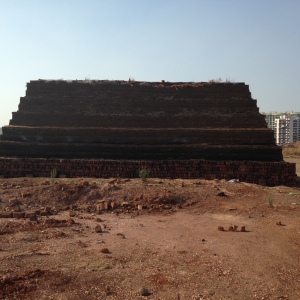
It is kind of hard to tell, but these bricks are being burned. This is the final stage of the brick-building process.
Some of the brick guild workers would talk to my Hindi-speaking colleagues, others would not. One of my colleagues told me that the workers have been warned by their employers not to speak to outsiders. The conditions on the brick guild were absolutely atrocious. The workers looked ill, frail, and malnourished. Everyone was covered in dirt and the makings of cement. There were stagnant pools of polluted water with children in them. The homes were nothing more than tarps hung on top of logs. These people’s lives consist of sleeping under these tarps and manually making cement bricks which is indeed physically demanding and hard labor. When I volunteered in Ecuador a few years ago, we built the foundations of a playground and had to manually mix cement for about 40 hours in two weeks. The sun was hot and it was physically exhausting. I can confidently say that it was the least favored part of the volunteer experience by my group. In the brick guilds, making cement in the Indian heat is a daily lifestyle for decades of these individual’s lives. I was truly astounded that this could possibly be real.
Currently, Yuva is working on creating child care centers on the guilds so that children can get some sort of education and be watched over as the parents are working. Two of my colleagues were successful in their efforts to get a child care center implemented at one of the guilds. They found out it was approved on one of their last days of their field work. Kudos to them!!! Without the implementation of child learning centers on the guilds, children will likely have no education. I’m still trying to wrap my head around how and why the government has not stopped this type of labor, but I will be sure to include it in my blog when I figure it out.
My first week of field has exposed me to some of the social problems India is experiencing right now and the challenges NGOs face at combating them. I am really curious to see what these next few months will teach me because I feel like I have really taken in so much since I have come to India a week ago. I know it took a long time for me to start blogging, but now that I am finally working in the field I will be updating it weekly. Thank you for reading this. I really believe it’s important that the world is not sheltered from the harsh realities that exist and that the NGOs, humanitarians, and advocates out there are acknowledged for the challenging work they devote themselves to. Peace and blessings 🙂
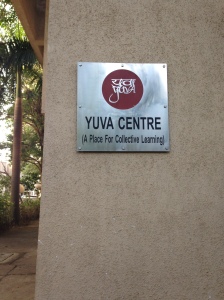
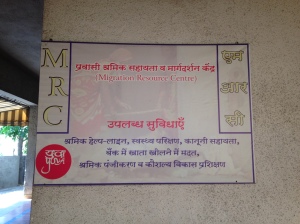
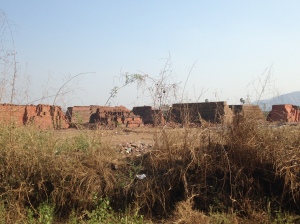
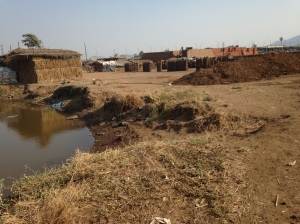
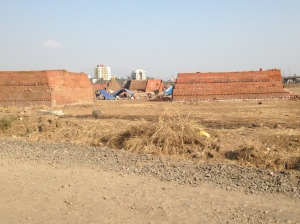
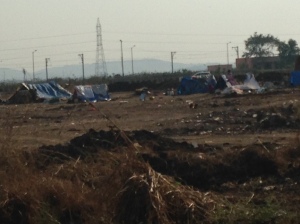
Very interesting, Cat. We learned a lot reading your blog. We’re looking forward to your future entries. Love you much, Poppa and Monga
LikeLike
This is great information Cat. Truly unbelievable what these folks endure. I’ll be checking your blog weekly. I’ll keep you and those people in my prayers. You take care and be safe. Love you and miss you! Dad & Mom.
LikeLike
Nice blog. Never really quite got what you did but I do not an much respect. I’ll be checkin out your blogs!
LikeLike
Hi Catherine,
You have provided a good overview of the health, security, livelihood and equity issues as they relate to migrant daily laborers and brick kiln workers. Your description of structural factors vis-a-vis gender, caste, age, colonialism and debt bondage provide a textured understanding of the problem and its differential and cumulative impacts.
You have also very nicely described current micro and messo level interventions by YUVA towards addressing these problems. I look forward to reading more about your findings regarding factors impacting access to education among these children, bonded labor and related public policy.
All the best with your work.
Shraddha
LikeLike
Cat, what a great post – full of info. on your placement and your impressions. I second Shraddha in her comment here: I would like to hear about the human rights / macro efforts to address this inequality.
Thanks for posting!
Pat
LikeLike